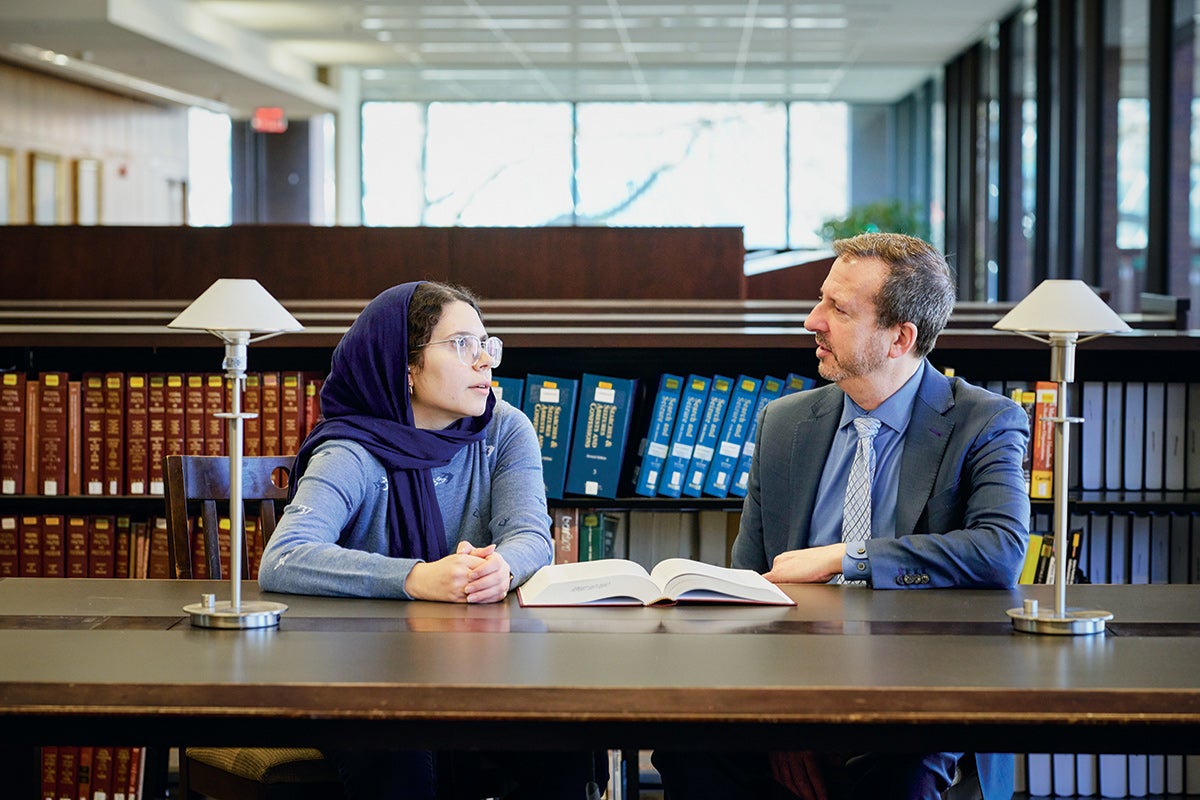lens
Making the Case
Law students win in appeals courts
 PHOTO: ROGER MASTROIANNICWRU law student Maryam Assar and Professor Andrew S. Pollis discuss some of their work at the Appellate Litigation Clinic. The other students in this year’s clinic are Francesca Bergeret, Veronika Bondarenko, Matt Borcas, Tristan Cavanaugh, Richard McGraw, Rebecca Singer-Miller, Ashley Mueller, Victoria Neikam, and Andrew Thompson.
PHOTO: ROGER MASTROIANNICWRU law student Maryam Assar and Professor Andrew S. Pollis discuss some of their work at the Appellate Litigation Clinic. The other students in this year’s clinic are Francesca Bergeret, Veronika Bondarenko, Matt Borcas, Tristan Cavanaugh, Richard McGraw, Rebecca Singer-Miller, Ashley Mueller, Victoria Neikam, and Andrew Thompson.Maryam Assar was parked in her car one March afternoon when she got a text from a fellow student at Case Western Reserve’s School of Law: They had won their case before the Ohio Court of Appeals.
Assar quickly read the decision on her phone and saw something remarkable: The court had overturned the trial judge’s decision using a legal theory she uncovered.
“It felt great,” she said. “It felt like what you do does make a difference. I was just really happy for our client.”
The ruling was an exhilarating moment in an unprecedented year for the law school’s Appellate Litigation Clinic, where students take the lead on cases.
The clinic handled its largest caseload since launching in 2020—filing briefs and delivering oral arguments in seven cases before the Ohio appeals court and the U.S. Court of Appeals for the Sixth Circuit. The majority are criminal appeals, with courts having appointed the clinic to represent convicted defendants who can’t afford to pay for lawyers.
The clinic’s students are responsible for everything from meeting with clients to writing briefs to conducting oral arguments. They also scour records and case law to identify where judges may have made missteps that could be a basis for appeal.
In the appeal decided in March, students represented a parent claiming that an after-school program failed to protect her child from other children’s repeated assaults. A county judge had summarily dismissed the case based on a common-law doctrine that protects businesses from unforeseeable criminal acts by others on their premises.
But Assar had discovered another doctrine she believed should apply. In essence, it states that anyone who voluntarily assumes a duty (such as supervising children), must exercise care in fulfilling the duty.
The appeals court agreed and sent the case back to the trial court.
The four students on the case “took it apart and put it back together in a way that enabled the appellate court to see not only the moral absurdity of dismissing the case, but also the legal grounding for rectifying that wrong result,” said Professor Andrew S. Pollis, JD, who heads the Appellate Litigation Clinic, one of 10 in the school’s Milton and Charlotte Kramer Law Clinic.
Students also secured a major victory in December. Their client had sought to withdraw a guilty plea after learning the state had withheld evidence from him. Trial and appellate courts rejected the request based on a statewide standard that students believed was too rigid and unclear.
They asked the Ohio Supreme Court to take their case and clarify the standard. The court did both, Pollis said, and the client won. Thirteen students worked on the case over three years, including Joseph Shell, JD (LAW ’20), who delivered the oral argument as an alumnus.
Since its start, the clinic has won 14 of 16 state appellate cases. That compares to average reversal rates of roughly one in 10 for criminal appeals, Pollis said, citing federal court data.
“My goal for clinic students is that they understand how important it is for everyone to have a lawyer who really goes to bat for the client and what a difference it can make,” Pollis said. “Nothing delivers that message like winning a tough case.”





